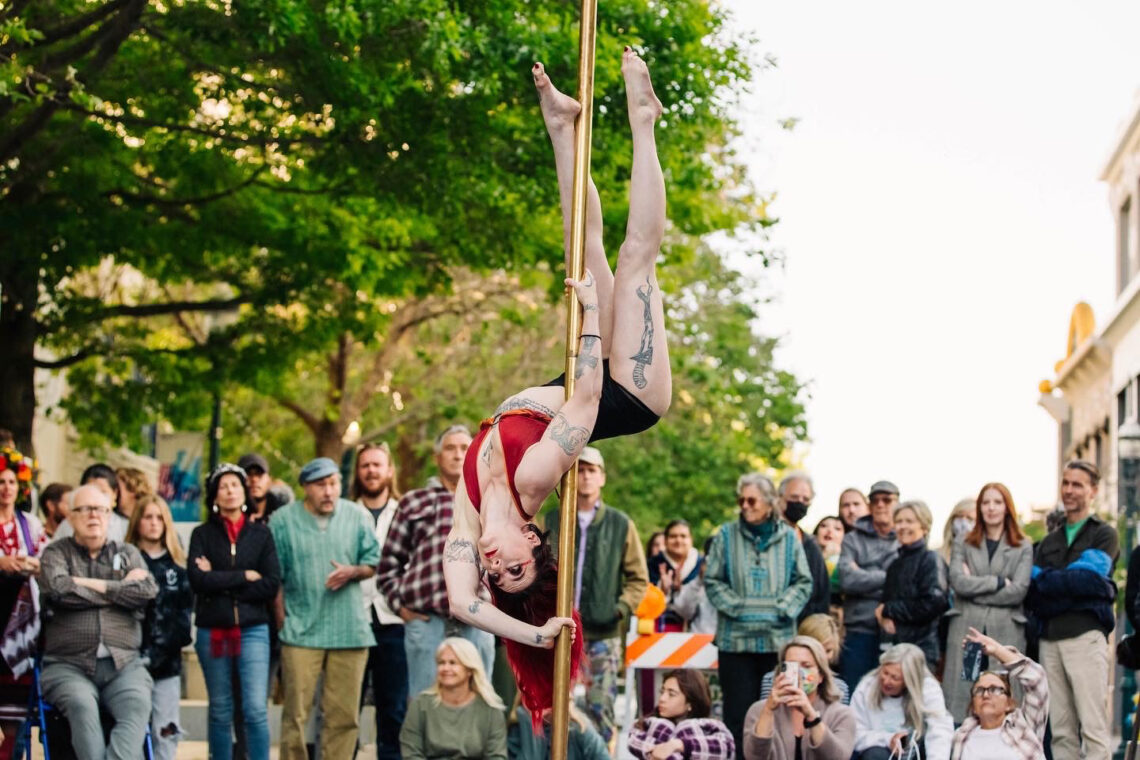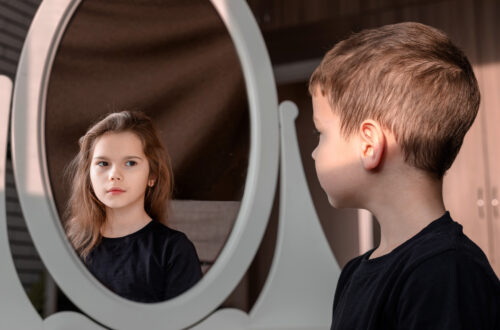
Jody Ryker
Circus Performer or Mathematician? Why Not Both?
By Jeanette Prather
Math teacher by day and circus performer by night, Jody Ryker seamlessly closes the chasm between these seemingly different worlds. “I split my time between my two passions, math and circus arts,” said Ryker, who identifies as non-binary and prefers the pronoun “they”. “I teach math part-time at Foothill College, and I teach part-time for various circus and pole studios.”
How did Ryker forge a path of teaching math and performing pole and circus arts?
“I’ve always been interested in many things, and I like always trying something new,” they said. “I’ve always felt that I need something that engages me intellectually, and I need to move.”
Ryker said they’ve felt like they’ve simultaneously entertained two different careers, teaching math, and performing and coaching circus. “I don’t really feel like it was ever a choice,” they said. “I don’t really understand people who can just do one thing and be satisfied with that. I also feel grateful that I’ve been given opportunities that allow me to do the things I want to and get paid.”
WHAT’S COMING UP
Currently, Ryker isn’t just teaching math and circus arts, but also putting together a cohesive pole instructor training program about how to reduce injury in the body. “I’ve been studying anatomy and physiology all throughout the pandemic, and I’m excited to incorporate this into my teaching,” they said. “A lot of injuries happen because our industry doesn’t usually talk about safe joint positions for specific tricks, and I want to change that. I’ve also developed a unique approach to breaking down components of tricks and creating specific drills for each necessary component.” Ryker also added that they’re learning and incorporating information about equity and inclusion, which they plan to add into their training program.
Beyond that, they run their own performance group, Pole Diversity, as well as choreograph for the performance group out of Santa Cruz’s local pole studio, Steel and Grace. With a collaborative spirit, Ryker enjoys joining other platforms and outlets that jive with their own mission and purpose. “I’ve got a lot of things coming up!” they said.
THE NONLINEAR PATH
Growing up, Ryker said they’ve always loved doing math. “I couldn’t get enough of it,” they said. “I majored in pure math and eventually was paid to do undergrad research that resulted in a couple papers. I went to grad school at UCSC for pure math.”
Despite their passion and excellence in mathematics, Ryker very quickly realized that there was an inequality between the male and non-male students within the UCSC grad school program. “I was warned by a fellow female student who had chosen to take a master’s and leave,” said Ryker. “Things just kept getting worse. There were microaggressions, such as a student putting up a sign saying, ‘no girls allowed’ in our grad offices, and a professor announcing during our Friday tea-time that the department had to lower the standards to admit any female students into the program (my scores were the same as my male friends’).”
Regardless, Ryker stuck it out, firmly believing that girls do not have the same opportunities to learn math as boys do, and if their scores are on average lower, it’s likely because of that rather than a difference in aptitude.
“There were worse things that happened [and] I stuck it out for nearly three years but couldn’t take it anymore,” they said. “I would never be able to do math at the level I was capable of in that environment and my mental health was suffering.”
While all of this was going on, Ryker’s circus career was blooming. “I was getting more opportunities to work in circus. I was treated with respect in those circles, and I was allowed to fully participate and grow as an artist,” they said. “I ended up giving up my dream of being a mathematician and instead found a new dream of being a circus professional. I do still do math for myself, but it took quite a while for me to recover from the trauma of grad school and be able to learn new math without having an anxiety response.”
Part of this trigger was what led to Ryker ultimately seeking out an autism diagnosis. “For a long time, I felt like there was something different about me that was making it hard for me to fit in. I tried to analyze what was different, whether it was in my performance style or how I interacted with other dancers, but I never quite got it right,” said Ryker. “I often felt like an outsider, but then I’d just focused even harder on the things that made more sense to me, like breaking down a difficult skill and developing a training regimine to achieve that skill.”
Ryker self-proclaims not being a charismatic person, which was a quality that most people expected of them. “Learning how to emote with my facial expressions was also (and still is) difficult for me,” they said. “I remember being a teenager and trying to study other people’s faces and train myself to make the correct expressions at certain times, but I never really got it right.”
The realization that Ryker’s brain simply developed differently, was an enlightening experience for them. “While certain skills such as facial expressions are more difficult for me, I have other advantages from my autism (I can vividly imagine new tricks and combos in my head, for example),” they said. “Learning to lean into my strengths and not be so hard on myself for other things has been really helpful.”
SOLID ADVICE IN A COVID WORLD
What would Ryker advise their decade-younger self if they came face to face? “You don’t have to ‘tough it out’ and let other people treat you poorly, and it’s not your fault,” they said. “Go somewhere and be around people who help you thrive (they exist!). You deserve to be treated with respect and to feel safe.”
In fact, they have this piece of advice for anyone out there struggling, especially the youth of today. “There are unlimited options out there, don’t let people and society limit you,” said Ryker. “If the opportunities people give you don’t fit, create your own opportunity.
“I think that people have realized [during COVID] that there are more options, more ways to do things. My entire life, I’ve noticed that people tend to just see the options that other people give them, or what culture dictates. I always saw unlimited options and tried to create my own opportunities when what was presented to me didn’t fit my goals.”
Ryker, who is walking the walk, emphasizes the exploration of options and figuring out what draws out an individual’s strengths and fulfills them. “I suppose the other side of this is to also not limit other people,” they said. “Don’t expect everyone to be the same; respect and appreciate other people who are different from you.”


You May Also Like

Defining Gender
June 1, 2022
Changing of the Seasons
June 1, 2022

